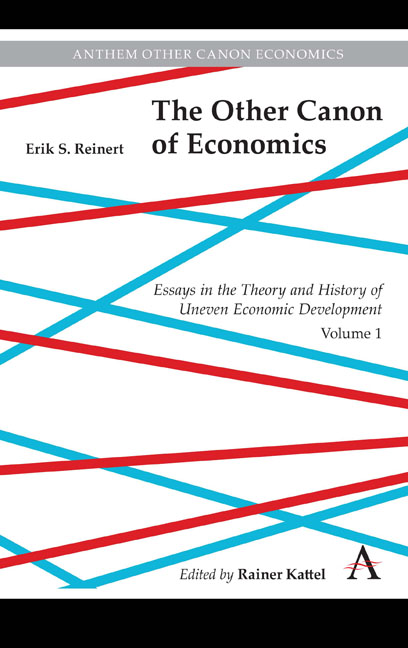Book contents
- Frontmatter
- Dedication
- Contents
- Introduction
- Chapter 1 Catching-up from Way Behind. A Third World Perspective on First World History
- Chapter 2 Recent Trends in Economic Theory — Implications for Development Geography
- Chapter 3 A Schumpeterian Theory of Underdevelopment - A Contradiction in Terms?
- Chapter 4 Competitiveness and Its Predecessors - A 500-Year Cross-national Perspective
- Chapter 5 Diminishing Returns and Economic Sustainability: The Dilemma of Resource-based Economies under a Free Trade Regime
- Chapter 6 Economics: ‘The Dismal Science’ or ‘The Never-ending Frontier of Knowledge’? On Technology, Energy and Economic Welfare
- Chapter 7 Production Capitalism vs. Financial Capitalism – Symbiosis and Parasitism. An Evolutionary Perspective and Bibliography
- Chapter 8 Globalization in the Periphery as a Morgenthau Plan: The Underdevelopment of Mongolia in the 1990s
- Chapter 9 Increasing Poverty in a Globalized World: Marshall Plans and Morgenthau Plans as Mechanisms of Polarization of World Incomes
- Chapter 10 An Early National Innovation System: The Case of Antonio Serra’s 1613 Breve Trattato
- Chapter 11 Innovation Systems of the Past: Modern Nation-States in a Historical Perspective. The Role of Innovations and of Systemic Effects in Economic Thought and Policy
- Chapter 12 The Other Canon: The History of Renaissance Economics
- Chapter 13 Benchmarking Success: The Dutch Republic (1500–1750) as Seen by Contemporary European Economists
- Chapter 14 Mercantilism and Economic Development: Schumpeterian Dynamics, Institution Building and International Benchmarking
- Chapter 15 Development and Social Goals: Balancing Aid and Development to Prevent ‘Welfare Colonialism’
Introduction
Published online by Cambridge University Press: 13 April 2024
- Frontmatter
- Dedication
- Contents
- Introduction
- Chapter 1 Catching-up from Way Behind. A Third World Perspective on First World History
- Chapter 2 Recent Trends in Economic Theory — Implications for Development Geography
- Chapter 3 A Schumpeterian Theory of Underdevelopment - A Contradiction in Terms?
- Chapter 4 Competitiveness and Its Predecessors - A 500-Year Cross-national Perspective
- Chapter 5 Diminishing Returns and Economic Sustainability: The Dilemma of Resource-based Economies under a Free Trade Regime
- Chapter 6 Economics: ‘The Dismal Science’ or ‘The Never-ending Frontier of Knowledge’? On Technology, Energy and Economic Welfare
- Chapter 7 Production Capitalism vs. Financial Capitalism – Symbiosis and Parasitism. An Evolutionary Perspective and Bibliography
- Chapter 8 Globalization in the Periphery as a Morgenthau Plan: The Underdevelopment of Mongolia in the 1990s
- Chapter 9 Increasing Poverty in a Globalized World: Marshall Plans and Morgenthau Plans as Mechanisms of Polarization of World Incomes
- Chapter 10 An Early National Innovation System: The Case of Antonio Serra’s 1613 Breve Trattato
- Chapter 11 Innovation Systems of the Past: Modern Nation-States in a Historical Perspective. The Role of Innovations and of Systemic Effects in Economic Thought and Policy
- Chapter 12 The Other Canon: The History of Renaissance Economics
- Chapter 13 Benchmarking Success: The Dutch Republic (1500–1750) as Seen by Contemporary European Economists
- Chapter 14 Mercantilism and Economic Development: Schumpeterian Dynamics, Institution Building and International Benchmarking
- Chapter 15 Development and Social Goals: Balancing Aid and Development to Prevent ‘Welfare Colonialism’
Summary
These volumes represent the second and last installment of my collected papers and chapters on economics. The first installment – The Visionary Realism of German Economics. From the Thirty Years’ War to the Cold War – was published in 2019, also then kindly collected and edited by Prof. Rainer Kattel of the Institute for Innovation and Public Purpose, University College London.
¡Viva el tercer extremismo! was once the only text in a mail I received from a Latin American friend: ‘long live the third extremism’. My friend and I are both what you can call children of the Cold War, born at its start in the late 1940s and spending many formative and active years under its reign until 1989. His point was that my form of extremism, instead of becoming a rigid ideology, was a rather extreme attention to historical facts and the tools and mechanisms they revealed. Indeed, I was very pleased when I found that an influential German economist, Gustav Schmoller, had referred to communism and what was to become neoliberalism as ‘twins of an ahistorical rationalism’1. My ‘extremism’ was intended to be the opposite, hopefully a ‘historical rationalism’, which by necessity had to be more complex than the simplistic solutions of the ‘ahistorical twins’ which dominated the Cold War view.
With time, I found that several approaches qualified as not belonging to any of the ‘ahistorical twins’ that dominated Cold War economics. I came to think of these as ‘reality economics’, but a philosophical discussion started within the group around ‘reality’ and we decided to adopt the term The Other Canon of Economics: the study of the economy as a real object, not defined in terms of the adoption of core assumptions and techniques. The end of this introduction provides a comparison between standard economics and The Other Canon, listing many economists who have provided input to The Other Canon. A family tree of The Other Canon is found here http://othercanon .org /family -tree/
The beginning of the Cold War brought a massive theoretical contradiction to the surface. We could call it Marshall vs. Samuelson. On June 5, 1947, US secretary of state George Marshall presented what was originally called ‘The European Recovery Plan’, later the ‘Marshall Plan’.
- Type
- Chapter
- Information
- The Other Canon of EconomicsEssays in the Theory and History of Uneven Economic Development, pp. 1 - 18Publisher: Anthem PressPrint publication year: 2024

